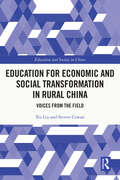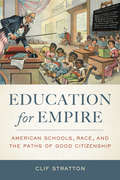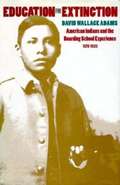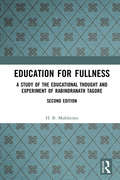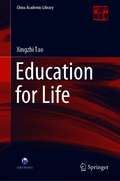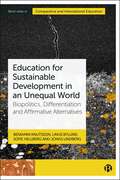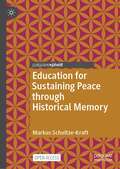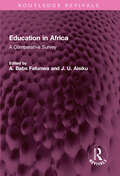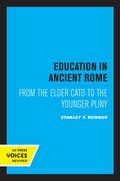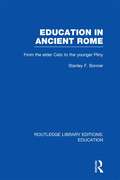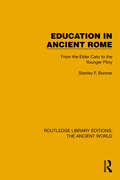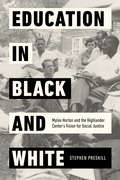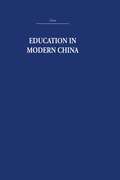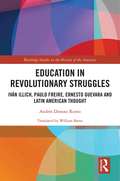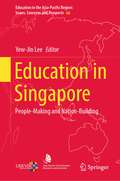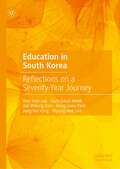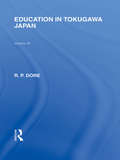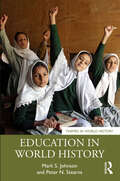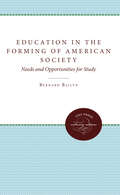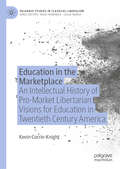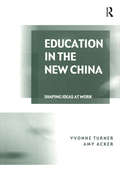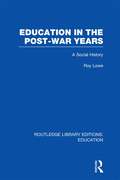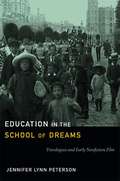- Table View
- List View
Education for Economic and Social Transformation in Rural China: Voices from the Field (Education and Society in China)
by Xu Liu Steven CowanLiu and Cowan offer a unique in-depth study of educational development and social transformation in rural China. It foregrounds identifiable settings and personalities, engaging readers with the voices and experiences of people who are involved with the education system. This book explores the link between educational transformation and local economic regeneration. The research covers important phases of the educational development programme outlined by the County’s tow five-year education plans. It records a wide range of perspectives on Chinese rural education from stakeholders engaged with the education service. It reveals the contingent and different factors that lie behind the complex pattern of the educational development process. This research also illustrates how education policy is administered and driven forward through the local officers working closely with school leaders. This intriguing look at rural Chinese educational development will interest academics and students specializing in the study of education and international development, Chinese education and society, education policy studies and modern China studies
Education for Empire
by Clif StrattonEducation for Empire brings together topics in American history often treated separately: schools, race, immigration, and empire building. During the Gilded Age and Progressive Era, American imperial ambitions abroad expanded as the country's public school system grew. How did this imperialism affect public education? School officials, teachers, and textbook authors used public education to place children, both native and foreign-born, on multiple uneven paths to citizenship. Using case studies from around the country, Clif Stratton deftly shows that public schooling and colonialism were intimately intertwined. This book reveals how students--from Asians in the U.S. West and Hawai'i to blacks in the South, Mexicans in the Southwest, and Puerto Ricans in the Caribbean and New York City--grappled with the expectations of citizenship imposed by nationalist professionals at the helm of curriculum and policy. Students of American history, American studies, and the history of education will find Education for Empire an eminently valuable book.
Education for Extinction: American Indians and the Boarding School Experience, 1875-1928
by David Wallace Adams(back of book) Winner Caughey Western History Association Book Prize Before and after photos of a Navajo student at the Carlisle School, ca. 1880 and 1883, courtesy of the National Anthropological Archives, Smithsonian Institution "This is, quite simply, a wonderful book. In lively prose, Adams tells the poig(nat) (covered by library sticker) ... linst American Indian chil(dren) (covered by library computer sticker) who sought to use bo(th) transforming Indian ] "3 1463 0066913173 mg. doing, and living. Adams demonstrates convincingly that Native American students were anything but passive recipients of the'curriculum of civilization.'" -Choice "Everything is here: the cropped hair and army uniforms, the endless drilling and marching, the round of daily chores, the spells in the guardhouse for speaking Indian, and the ubiquitous little school graveyards that signaled the terrible toll these institutions took on young lives. Required reading for all students of United States race relations." -London Times Higher Education Supplement "A story worth reading and remembering, one that reveals the use of education as a weapon of war, a method of domination. A strong lesson in the potential for education to become part of a political and cultural arsenal." -American Journal of Education "Persuasive and moving, this book is full of good stories that should appeal to the general public." -Brian Dippie, author of The Vanishing American: White Attitudes and U.S. Indian Policy "An important contribution to the literature of Indian-white relations." -Robert M. Utley, author of The Lance and the Shield: The Life and Times of Sitting Bull "Richly detailed and extremely well written." -Western Historical Quarterly David Adams is associate professor of education at Cleveland State University.
Education for Fullness: A Study of the Educational Thought and Experiment of Rabindranath Tagore
by H. B. MukherjeeThis volume is the first comprehensive exploration of Rabindranath Tagore’s works on education and pedagogy. It presents a valuable account of the creation of Santiniketan and Visva-Bharati, Tagore’s vision of social regeneration, and his rejection of the colonial scheme; while reflecting on significant events of his life and his ideas. The book evaluates Tagore’s unique contribution to education and discusses his views on fundamental issues, such as aim, method, discipline, and medium. It reinforces for readers today the relevance of his experiments and activities in the field of education. Drawing from various sources, the book also offers bibliographic information on Tagore’s writing on education. This new edition with a new Introduction and Foreword will be of immense value to educationists, teachers, policymakers, and those interested in modern Indian history and the philosophy of education.
Education for Life (China Academic Library)
by Xingzhi TaoThis book is an anthology of English writing on education by Tao Xingzhi, the great Chinese educator and thinker. It includes several articles that represent his educational ideas and life philosophy, such as China in Transition, Creative Education, The Little Teacher and the Literacy Movement, and Education for All. These works are not only highly readable, but also present educational philosophies that are closely related to real life, and can be used to highlight and correct the deviations of strongly utilitarian educational concepts in modern society. Further, the appendix includes stories, fables, and poems translated by Tao Xingzhi, as well as his own poems written in Chinese and translated into English. This book offers readers interested in education’s new perspectives and inspiration. It also contributes to a more comprehensive and accurate understanding of Tao Xingzhi as well as his educational theories.
Education for Sustainable Development in an Unequal World: Biopolitics, Differentiation and Affirmative Alternatives (Bristol Studies in Comparative and International Education)
by Sofie Hellberg Jonas Lindberg Beniamin Knutsson Linus BylundEducation for Sustainable Development (ESD) is recurrently depicted as an enterprise that unites humanity in a common pursuit of a more just and sustainable world. But how is this enterprise pursued on a planet that is enormously unequal? Drawing on biopolitical theory and rich empirical data from different contexts around the world, this book explores how ESD is unpacked depending on whether people are rich or poor. The book demonstrates how ESD is adapted to the lifestyles and living conditions of different populations. The implication of this depoliticized sensitivity to local ‘realities’, the book argues, is that inequality becomes accommodated and that different responsibilities are assigned to rich and poor. Ultimately, the book considers alternatives to this biopolitical divide.
Education for Sustaining Peace through Historical Memory (Memory Politics and Transitional Justice)
by Markus Schultze-KraftInformed by the author’s long-standing work on violent conflict, peace and education in countries of the Global South, particularly Colombia, this open access book presents a comprehensive narrative about the relationship between peace education, historical memory and the sustaining peace agenda, advocating for the adoption of a new perspective on education for sustaining peace through historical memory. Education on and for peace in countries wrestling with, or emerging from, protracted violent conflict is up against major challenges, and both conventional and critical approaches to peace education are limited to address these. Incorporating a focus on historical memory, without losing sight of its own pitfalls, into peace education can support learners and teachers to come to grips with achieving positive, peace-sustaining change at both the micro (individual) and macro (social and institutional) levels, and to develop concepts and practices of effective and legitimate alternatives to violence and war. Conceived in these terms, historical memory-oriented peace education also stands to enhance the work-in-progress that is the UN-led sustaining peace agenda, including its Sustainable Development Goals.
Education in Africa: A Comparative Survey (Routledge Revivals)
by A. Babs Fafunwa; J. U. AisikuFirst published in 1982, Education in Africa offers a comprehensive treatment of the development of education in Africa. Until now only scattered documents on educational growth in individual countries have been available; works devoted to Africa as a whole have tended towards the general and have, by and large, been written by outside observers. This book is a collection of illuminating syntheses of major trends in educational development in Africa, by renowned African educationists, and is the first attempt to supply the need for a comprehensive book on African education written from an African viewpoint. All but one of the chapters were written specially for the book by leading African educators each of whom has had a distinguished career and wide experience in education in his or her own country; they represent eleven nations in all. The volume is designed for African students, teachers and administrators and will also be welcomed by educational planners and by scholars working in the fields of comparative education and the history of education. It will be of special interest to departments, institutions and faculties of education in all the universities and colleges of education in Africa, and to educators and students worldwide who are concerned with comparative African education.
Education in Albuquerque
by Ann Piper Dr Ernie StapletonA mix of cultures unique to any space in North America funneled into the Albuquerque, New Mexico, area after Spanish invaders stumbled in through the south in 1506. For centuries, indigenous Americans had established ways of knowing and transmitting learning to their young, but colliding old and new cultures left the area's learning communities irrevocably changed. Subsequently, other native tribes and more European, South American, and Asian cultures proudly ported their perceived best practices concerning educating youth into the area. In 1880, the railroad, bolstered by powerful Anglo economic forces, blasted into Albuquerque, carrying new cultures clinging to the railcars: Greeks, Italians, Germans, Jews of many heritages, English, Easterners, Southerners, a host of cowboys, farmers, merchants, and more--all shadowed by motivated politicians. The founding, unfolding, and evolution of educational systems in Albuquerque weaves a crazy-quilt story regarding public, private, and parochial schooling--as well as regrettably ill-founded systems that wronged natives.
Education in Ancient Rome: From the Elder Cato to the Younger Pliny
by Stanley F. BonnerThis title is part of UC Press's Voices Revived program, which commemorates University of California Press’s mission to seek out and cultivate the brightest minds and give them voice, reach, and impact. Drawing on a backlist dating to 1893, Voices Revived makes high-quality, peer-reviewed scholarship accessible once again using print-on-demand technology. This title was originally published in 1977.
Education in Ancient Rome: From the Elder Cato to the Younger Pliny (Routledge Library Editions: Education)
by Stanley BonnerThis volume examines the development, structure and role of education from the third century B.C to the time of Trajan, a period which saw great changes in Roman society. When originally published it was the first complete review of the subject for half a century and was based on a new collection and analysis of ancient source material. The book is divided into three parts. The first provides historical background, showing the effects upon the educational system of Rome’s transition from a predominantly agricultural community to a great metropolis; it traces the development of primary, grammar and rhetoric schools, and discusses educational standards both in early Rome and under the Empire, when advanced teaching was more widely available, but often adversely affected by weakening social values and diminished parental control. The volume goes on to describe the physical conditions of teaching – accommodation, equipment, discipline, the economic position of teachers and the fee-paying system, and the part played by the State. Finally, he gives a full appraisal of the standard teaching programme, from the elementary study of the three Rs, to the theory and practice of rhetoric, in which the needs of the future advocate were constantly borne in mind.
Education in Ancient Rome: From the Elder Cato to the Younger Pliny (Routledge Library Editions: The Ancient World)
by Stanley F. BonnerEducation in Ancient Rome (1977) examines the development, structure and role of education from the third century B.C. to the time of Trajan, a period which saw great changes in Roman society. It provides a historical background, showing the effects upon the educational system of Rome’s transition from an agricultural community to a great metropolis, tracing the development of primary, grammar and rhetoric schools, and discussing the standards of upbringing and education. The book then looks at the physical conditions of teaching – accommodation, equipment, discipline, the economic position of teachers, the fee-paying system, and the part played by the Roman State. Finally, it gives a full appraisal of the standard Roman teaching programme.
Education in Black and White: Myles Horton and the Highlander Center's Vision for Social Justice
by Stephen PreskillHow Myles Horton and the Highlander Folk School catalyzed social justice and democratic education For too long, the story of life-changing teacher and activist Myles Horton has escaped the public spotlight. An inspiring and humble leader whose work influenced the civil rights movement, Horton helped thousands of marginalized people gain greater control over their lives. Born and raised in early twentieth-century Tennessee, Horton was appalled by the disrespect and discrimination that was heaped on poor people—both black and white—throughout Appalachia. He resolved to create a place that would be available to all, where regular people could talk, learn from one another, and get to the heart of issues of class and race, and right and wrong. And so in 1932, Horton cofounded the Highlander Folk School, smack in the middle of Tennessee.The first biography of Myles Horton in twenty-five years, Education in Black and White focuses on the educational theories and strategies he first developed at Highlander to serve the interests of the poor, the marginalized, and the oppressed. His personal vision keenly influenced everyone from Rosa Parks and Martin Luther King, Jr., to Eleanor Roosevelt and Congressman John Lewis. Stephen Preskill chronicles how Horton gained influence as an advocate for organized labor, an activist for civil rights, a supporter of Appalachian self-empowerment, an architect of an international popular-education network, and a champion for direct democracy, showing how the example Horton set remains education’s best hope for today.
Education in Modern China
by R.F. PriceFirst published in 1970 this re-issues the revised edition of 1979. This book examines the part played both by tradition and by the Cultural Revolution in the educational system of twentieth century China and explores the apparent reversal of policy which took place since the death of Mao. The book discusses the writings of Mao on the nature of man, society and knowledge and his ideas on education. These are then seen in the context of history, philosophy and religion. Educational aims and policies are discussed, showing how factors such as language, geography, economics and the social structure created obstacles to reform.
Education in Revolutionary Struggles: Iván Illich, Paulo Freire, Ernesto Guevara and Latin American Thought
by Andrés Donoso RomoEducation in Revolutionary Struggles introduces us to the fascinating world of Latin American educational thought in the third quarter of the 20th century. It discusses the contributions of three of the most distinguished intellectuals of the period – Iván Illich, Paulo Freire and Ernesto Guevara – and more specifically their answers to the eternal challenge: What is – or should be – the role of education in the profound structural and/or revolutionary transformation of our societies? The first part of the book identifies the cultural, economic and political context of the revolutionary years in Latin America. This historical framework is of particular interest because it is the setting for the intellectual and educational debates in which these three thinkers took part. The second part, the heart of the book, expounds in depth how Iván Illich, Paulo Freire and Ernesto Guevara contributed to understanding of how education is linked to the transformation of society. The third and final part highlights the most fertile dimensions of the educational thought of Iván Illich, Paulo Freire and Ernesto Guevara – deschooling, liberation education and revolutionary education respectively – and analyses the points where their conceptions of "education in revolutionary struggles" converged, complemented one another or diverged.
Education in Singapore: People-Making and Nation-Building (Education in the Asia-Pacific Region: Issues, Concerns and Prospects #66)
by Yew-Jin LeeThis edited book is a comprehensive resource for understanding the history as well as the current status of educational practices in Singapore. It is a one-stop reference guide to education and educational issues/concerns here. There are three sections: Part 1 provides a sectorial overview of how education has been organized in this country such as preschool, special needs, primary and secondary, and adult education divisions. In Part 2, contributors critically delve into issues and policies that are pertinent to understanding education here such as underachievement, leadership, language education, assessment, and meritocracy to question what Part 1 might have taken for granted. Part 3 contains the largest number of contributors because it offers a scholarly examination into specific subject histories. This section stands out because of the comparative rarity of its subject matter (history of Physical Education, Art, Music, Geography Education, etc.) in Singapore.
Education in South Korea: Reflections on a Seventy-Year Journey
by Don-Hee Lee Sam-Geun Kwak Jae-Woong Kim Dong-Joon Park Jung-Ho Yang Myung-Hee LeeThis book, the result of a landmark colloquium held in Korea to reflect on the role of education in Korean society, provides fascinating insights into the interplay of political evolution and pedagogy. Korea has gone from one of the world's poorest societies after the Korean War to one of its richest, and is a home of technological innovation; many attribute this ‘Korean Miracle’ to the emphasis placed on education in this Confucian society. How did the Korean state form, and how were educational institutions created and given legitimacy? During the industrialization period- roughly, 1961-1994- how did education foster national development? Lastly, since 1995's May 31 Education Reform, how has the educational system responded to and created a new information age in a newly democratic Korea? This book will be of interest to East Asian scholars, scholars of education, human resources development, and IT, and historians looking for ways to achieve the ‘Korean Miracle’ in their own countries.
Education in Tokugawa Japan (Routledge Library Editions: Japan)
by Ronald DoreJapanese cultural life had reached a low ebb at the beginning of the Tokugawa period. The Japanese society which emerged when Tokugawa Ieyasu had completed the process of pacifying warring baronies was neither literary, nor hardly literate. The rulers were warriors and the people they ruled were largely illiterate. The Japan of 1868 was a very different society: practically every samurai was literate and it was a world in which books abounded. The transformation which had occurred in these two and a half centuries was an essential precondition for the success of the policy which the leaders of the Meiji Restoration were to adopt. An in-depth survey of the development and education during the period, this book remains one of the key analyses of the effects of Tokugawa educators and education on modern day Japan.
Education in World History (Themes in World History)
by Peter N. Stearns Mark S. JohnsonEducation in World History shows how broad currents in transnational history have interacted with trends in educational organization and teaching practices over time. From antiquity and early classical societies to present day, this book highlights the ways in which changes in religious and intellectual life and economic patterns in key world regions have generated developments in education. Since the postclassical period, cross-cultural connections have also influenced educational change. In more recent times, transnational dialogues and mobility have played a vital role in shaping educational patterns. Ranging through South and East Asia, Africa, Europe and the Americas, the book also considers how the impact of modern forces, such as industrialization and nationalism, have transformed education in fundamental ways. Throughout the volume, Mark S. Johnson and Peter N. Stearns emphasize the tensions between elite and state educational interests and more diverse popular demands for access and, often, for more innovative pedagogy. Suitable for introductory world history and history of education courses, this lively overview reconsiders the history of education from the perspective of world and comparative history.
Education in the Forming of American Society: Needs and Opportunities for Study
by Bernard BailynEducation presents a far different prospect. The history of American education offers great opportunities for re-study, but not because it has been neglected or because it was strewn with technical abstractions during the early period. Instead, it has suffered at the hands of specialists who, with the development of public education at heart, sought historical arguments to strengthen their "cause."
Education in the Forming of American Society: Needs and Opportunities for Study (Published by the Omohundro Institute of Early American History and Culture and the University of North Carolina Press)
by Bernard BailynIn a pungent revision of the professional educator's school of history, Bailyn traces the cultural context of education in early American society and the evolution of educational standards in the colonies. His analysis ranges beyond formal education to encompass such vital social determinants as the family, apprenticeship, and organized religion.Originally published in 1960.A UNC Press Enduring Edition -- UNC Press Enduring Editions use the latest in digital technology to make available again books from our distinguished backlist that were previously out of print. These editions are published unaltered from the original, and are presented in affordable paperback formats, bringing readers both historical and cultural value.
Education in the Marketplace: An Intellectual History of Pro-Market Libertarian Visions for Education in Twentieth Century America (Palgrave Studies in Classical Liberalism)
by Kevin Currie-KnightThis book offers an intellectual history of the libertarian case for markets in education. Currie-Knight tracks the diverse and evolving arguments libertarians have made, with each chapter devoted to a different libertarian thinker, their reasoning and their impact. What are the issues libertarians have had with state-controlled public schooling? What have been the libertarian voices on the benefits of markets in education? How have these thinkers interacted with law and policy? All of these questions are considered in this important text for those interested in debates over market mechanisms in education and those who are keen to understand how those arguments have changed over time.
Education in the New China: Shaping Ideas at Work
by Yvonne Turner Amy AckerThe effects of the de-regulation of the Chinese university system have been nothing short of spectacular. For the first time since 1949, students possessing neither gifted intellect nor political connections have been able to share in the benefits of higher education, while a flood of international educators have opened up a previously cloistered and politically sensitized academic world. This fascinating book examines China’s higher education system, and how it’s new and unique blend of foreign and Chinese perspectives impact on both the lives of students and academics and wider Chinese society. Viewed with suspicion as a new type of Chinese by the older generation and by the government, they are at the same time the very entrepreneurs driving the economic and social revolution sweeping the country. Using a range of in-depth interviews and unique research, it provides open and often frank accounts of life, work and education in China, from the Cultural Revolution to the creation of its market-focused entrepreneurial generation. Candid and illuminating, this is a book no serious reader of Asian studies, comparative education or Asian sociology will want to be without.
Education in the Post-War Years: A Social History (Routledge Library Editions: Education)
by Roy LoweThis book provides an overview of the relationship between the sweeping social changes of the post-war period and education in England. It outlines the major demographic cultural and socio-economic developments which made new demands of the education service during the twenty years following the War and analyses the responses made by schools, colleges and universities. The book provides not only an informed narrative of the development of formal education, but also an authoritative account of the ways in which suburbanisation and the growth of the new property-owning middle class determined both the rhetoric of education and the structure of the system which emerged through the implementation of the 1944 Education Act.
Education in the School of Dreams: Travelogues and Early Nonfiction Film
by Peterson Jennifer LynnIn the earliest years of cinema, travelogues were a staple of variety film programs in commercial motion picture theaters. These short films, also known as "scenics," depicted tourist destinations and exotic landscapes otherwise inaccessible to most viewers. Scenics were so popular that they were briefly touted as the future of film. But despite their pervasiveness during the early twentieth century, travelogues have been overlooked by film historians and critics. In Education in the School of Dreams, Jennifer Lynn Peterson recovers this lost archive. Through innovative readings of travelogues and other nonfiction films exhibited in the United States between 1907 and 1915, she offers fresh insights into the aesthetic and commercial history of early cinema and provides a new perspective on the intersection of American culture, imperialism, and modernity in the nickelodeon era. Peterson describes the travelogue's characteristic form and style and demonstrates how imperialist ideologies were realized and reshaped through the moving image. She argues that although educational films were intended to legitimate filmgoing for middle-class audiences, travelogues were not simply vehicles for elite ideology. As a form of instructive entertainment, these technological moving landscapes were both formulaic and also wondrous and dreamlike. Considering issues of spectatorship and affect, Peterson argues that scenics produced and disrupted viewers' complacency about their own place in the world.
